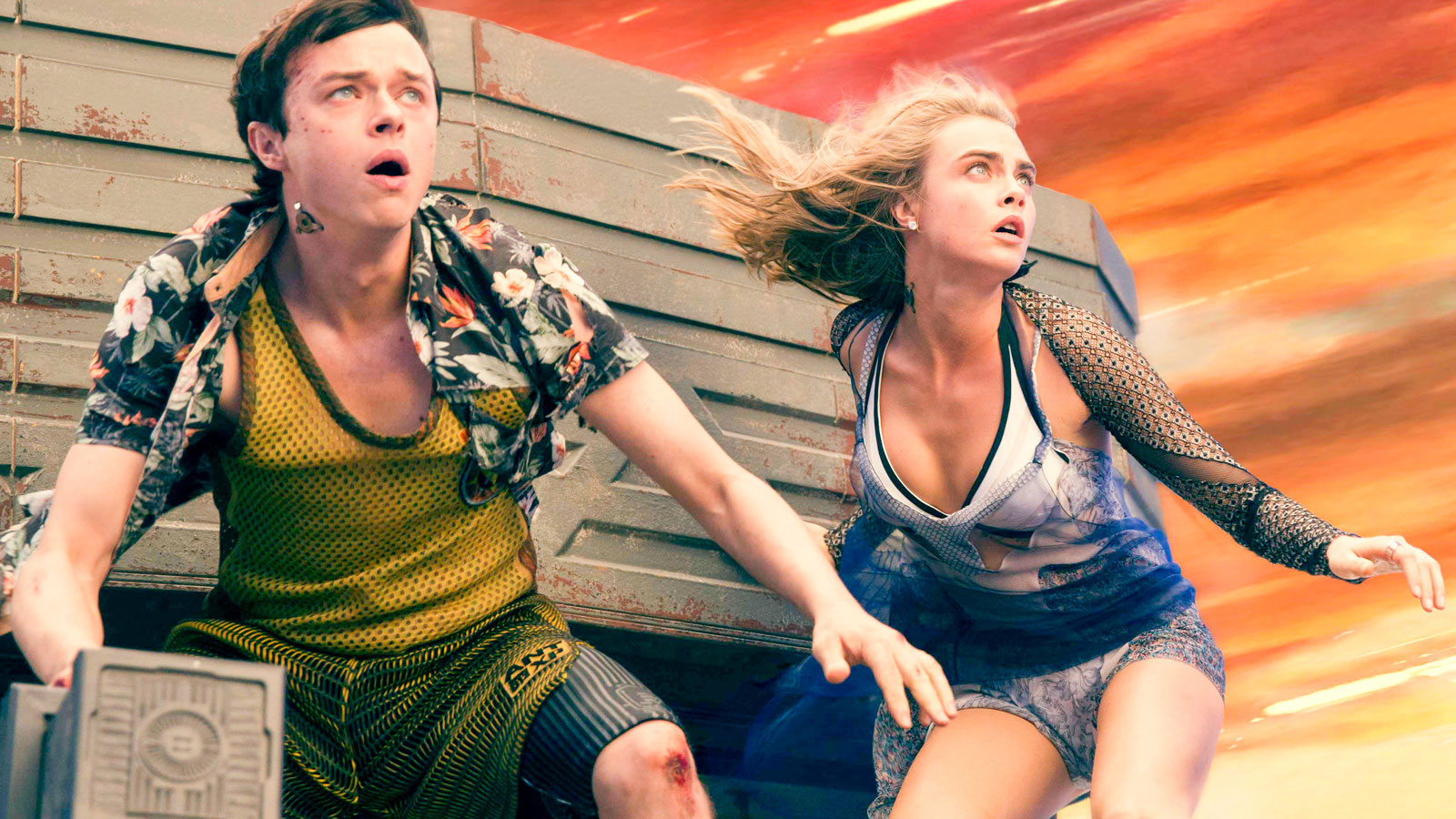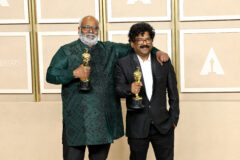Luc Besson is never not on his bullshit. There was Lucy, in which Scarlett Johansson becomes a god after accessing 100% of her brain through drugs, an incredible moment of pseudo-science; there was also the entirety of The Fifth Element, but more specifically, the part where Bruce Willis making out with an alien saves the universe. And there’s the scene in Valerian and the City of a Thousand Planets where Rihanna plays a shape-shifting burlesque dancer enslaved at an intergalactic sex parlor. Her name, we’re told after she does a risqué pole dance, is Bubble. Not Andromeda, or Promethea, or any other kind of cool alien name, but Bubble.
Rihanna’s Valerian scenes really only last a few minutes. She does that dance, switches a few outlandish outfits, and then dies. Her character spends most of her time in an amorphous, CGI’d goopy state from which we only hear her unmistakable accent. You could cut out her entire sequence, and the movie—which pushes up against the two-and-a-half-hour mark—wouldn’t suffer for any continuity gaps. But if you have a chance to have Rihanna in your movie, why not milk it for all it’s worth?
Such is the primal joy of Valerian, an awe-inspiring movie that debuted over the weekend, and is a rarity at the summer box office: a conceptually bananas, visually outrageous action movie that doesn’t exist to set up several sequels down the line. It’s firmly situated in the tradition of movies like Besson’s Fifth Element, or the Wachowskis’ Jupiter Ascending, conceptually overloaded sci-fi romps walking a tight line between seriousness and silliness.
Valerian isn’t high art—it doesn’t probe hidden corners of the human experience, or even show you what it was like to be horny at an all-girls school during the Civil War. It’s more than acceptable to reject it because you outright dislike all nerd shit. But in a movie-going climate inundated with nerdy action movies, it’s a little perplexing that Valerian was rejected so soundly by critics and moviegoers. There’s really no reason why something like Spider-Man: Homecoming, a heavily focus-tested movie from the woke teen banter to the cameos from hip comedians like Hannibal Buress, should sit with a 92% “fresh” rating on Rotten Tomatoes while Valerian scores headlines calling it “really… that bad.” Its probable box office failure says something depressing about how the current cinematic climate has trained audiences to think about their summer blockbusters, and how critics have largely gone along.
Valerian is largely set in the titular city of a thousand planets, called Alpha in the movie and described in the Valerian and Laureline comics from which it’s adapted as: “A name heard in a thousand tongues in a thousand places of the galaxy. Immense artificial construction, endlessly sprouting new ports. Living mosaic showcasing the incredible diversity of the universe…” Purply expository captions like these have been localized from the original French, but the tone of awe and wonder is inextricable from comic books; if you’re about to experience a science-fiction world, the writing better sell you on that sense of the fantastic. Alpha, as we learn in the movie’s opening beats, was originally an 21st century intergalactic space station hovering above the Earth. With the increased bulk of the station threatening Earth’s gravity, it shot off into the depths of space, continuing to grow and attract life from around the universe.
Fast forward a few hundred years, and humanity is a firm part of the intergalactic order. Valerian (Dane Dehaan) and Laureline (Cara Delevingne) are partnered agents of the extrajudicial task force that polices the universe, sort of like the space FBI; they’re also lovers on the cusp of marriage, provided the puckish Valerian can grow up. They’re tasked with retrieving a living matter converter (as in, it’s an animal that converts matter) on a world known for its expansive marketplace, the quirk being that the market is entirely virtual: Visitors strap on headsets as they enter, and wander what’s in real life just a desert expanse.
The converter is somehow related to images of a dying planet that Valerian experiences at the movie’s beginning. It’s also a fantastically coveted item, desired by a shady military commander (Clive Owen), a grimy black market dealer whose piggish face recalls the Fifth Element baddies, and some mysterious silvery aliens who flit around the scenery. When Valerian and Laureline bring the converter to Alpha, they’re swept into a conspiracy inside the city that might destroy it, or at least disrupt the fragile global order they’re dedicated to maintaining.
The premise is largely an excuse for Besson to delight in bringing all sorts of wild concept art alive in glorious 3D. Neon jellyfish bestow psychic visions when placed atop someone’s head; hideous talking gargoyles provide gossip for a price; brutish aliens abduct Laureline and force her to try on fancy dresses before presenting food to their king; Ethan Hawke plays a space-pimp who wears a cowboy hat, for some reason. Valerian and Laureline perform dozens of daring stunts in the middle of all this zaniness; Besson’s imagery draws deeply from the French comics, which are imbued with that Kirby-esque flair for space fantasy, but his experience as a lauded action director helps it all breathe without getting cluttered.
Dehaan is passable enough as the alternately stoic and roguish Valerian—his voice is way too deep for someone who looks like Leonardo Dicaprio’s twerpy brother—but Delevingne does better as the charming, empathetic Laureline, who refuses to take a backseat to her partner’s male assertion. They recite the comic book-y dialogue with devotion, though my theater couldn’t help but chuckle at some of the campier moments, such as a scene where Valerian arrests an alien and tells him, face devoid of emotion, “I serve a noble cause. It’s called the law.”
As Valerian and Laureline progress closer to the truth, it turns out their military overlords know a little something about an accidental genocide that’s related to those mysterious silvery aliens. There are monologues delivered about love, and colonialism, and illegal immigration—heady stuff that doesn’t always ring with the gravitas it’s meant to, but which Dehaan and Delevingne deliver as best they can. English isn’t the native language of Valerian, anyways, and thematic headiness isn’t the point. It’s more important to revel in the vision, and have a good time.
https://www.youtube.com/watch?v=49kRjfjpiq0
It’s not a new, or exciting observation to point out that superhero movies are the culturally dominant summer blockbuster genre. Your tolerance for the endless churn of franchises, from 2000’s X-Men all the way down to this year’s Wonder Woman, may vary. Exhaustive the schedule may be, you generally look like a crank if you insist that the movies seen and beloved by thousands of Americans each year are, in fact, total crap, unless there’s some convincing political argument to be attached to the critique—like something about how Michael Bay’s Transformers propped up the military-industrial complex, along with Shia LaBeouf’s leading man prospects.
Nevertheless, the hegemony of the superhero industry has evolved in subtle ways. The Spider-Man series, for example, which flopped a few years ago with a series of terrifically moody Andrew Garfield movies, but then lucked itself into a full-blown reboot—the franchise’s second—with Homecoming, opened up at the box office with $117 million. That’s enough to make it an unqualified success, especially as Tom Holland is signed on to do at least two more sequels, as well as cameos in however more Marvel movies exist to be made.
We might expect to get another half-decade or more out of the franchise’s current iteration, at least until the actors age out… at which point we’ll just reboot and move onto the next generation, as has happened before. Because these movies make too much money, there’s no incentive to declare that enough is enough, and we don’t need to go through yet another cinematic rendition of Peter Parker getting bitten by a spider. There’s safety in recognizable properties, besides, especially ones that deliver on expected emotional arcs. You know exactly where Peter Parker’s story is going to take you; his character isn’t allowed to act in any other way.
That wouldn’t be a huge problem if the market allowed for all types of movies, but it doesn’t: As the Ringer’s Sean Fennessey recently pointed out, just 31 of the top grossing 100 movies released in 2016 were original properties, rather than previously-existing source material. “Hollywood has algorithmized itself with precision, and the removal of the middle hasn’t just hurt audiences looking for solid, adult entertainment — it has hurt those in search of dumb fun,” he wrote. I don’t think it’s snobbish to suggest that everyone is better served when the types of movies being made are as diverse as possible, rather than explicit rehashes of stories and characters we’ve seen a thousand times.
Valerian, of course, is based on a comic book. But the concept is all-but-foreign to American audiences, and it was a deep passion project for Besson rather than some corporate-mandated initiative: He spent more than a decade making it, even when it was clear no studio cared. Valerian is the most expensive independent film ever produced, and was made with the help of his film school students.
More than its independence from the current trend, I enjoyed Valerian because it was so incredibly goofy. This isn’t some contrarian, “so bad it’s actually good” argument, but in a world where so many movies are like Homecoming, meticulously manicured to remove all trace of embarrassment or questionable logic, it was oddly refreshing to see a expensive movie unafraid to be nonsensical. The risk of losing a ton of money wasn’t enough to deter Besson from making this specific movie, rife with its own logical contradictions and stilted dialogue, a daringness also allowing it to achieve such exhilarating highs.
Valerian isn’t the first blockbuster Rihanna has starred in: She was a part of Battleship, the toy-game-turned-attempted-franchise with Taylor Kirsch, and a bunch of soldiers. That movie was a gigantic bummer, as was her role: She swiveled a few turrets, delivered some military-speak, and got off a few pithy one-liners. There, she disappeared into the grim tableau; here, she’s allowed to steal the movie. Who else would’ve given her the chance? And what more would you want from a lively summer blockbuster?
There might be a sequel, but only if it makes enough money, which is already a dicey proposition. Still: If it does, the giddiness of this one might not preclude the bloat of any type of sequel. That’s fine, though. Some movies are supposed to float on their own, free from any responsibility about what comes next.





